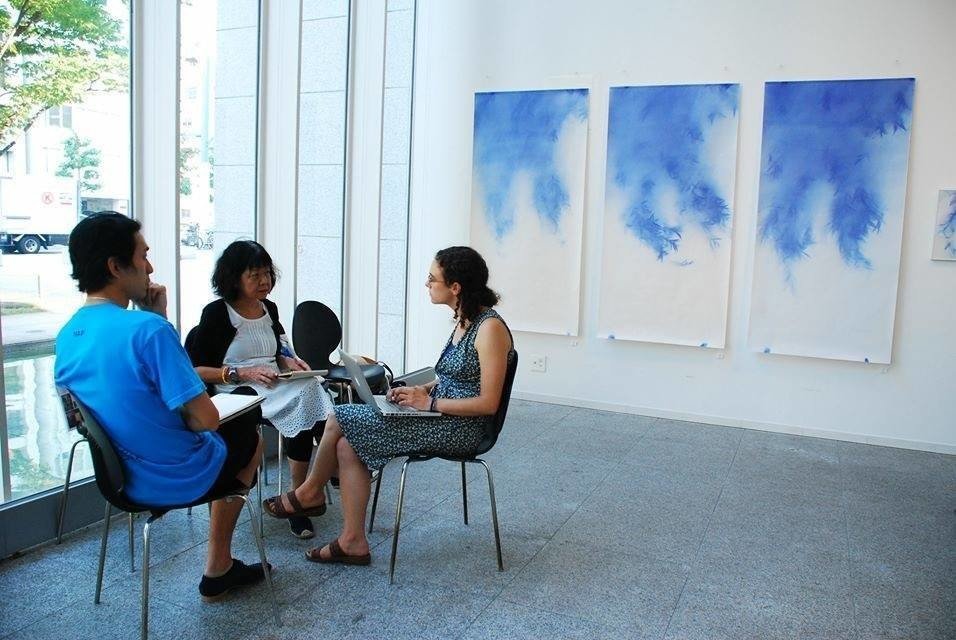
【Art Project 2015】作品を通して生まれる出会いと思考:ヒロシマでの対話(2015年8月被爆70年の節目にて)
2015年被爆70年の節目の年の8月。
7/28-8/2、広島gallery Gで開催した個展『呼吸する影ー被爆樹木のフォトグラムー』で会ったEmilyさんがテキストを送ってくれました。
彼女はマンハッタンプロジェクトの科学者の孫娘です。
ヒロシマや戦争のことを独自に調査する為ヒロシマに来ていたところ、個展をしていた私の作品を観てくれてインタビューを受けました。

なぜヒロシマに来たのか?作品制作を通して何を感じ、考えているのか?
伝えたいことは何なのか?等々...
彼女の質問を受け答えているうちに様々な事柄が思い出され繋がっていく感覚になりました。
彼女の祖父のことも話してくれました。
科学者として実験を行っていたが、それが何のためのものなのか知らされることはなく、末端の作業では高校生ぐらいの女の子がレバーを操作する軽作業を行っていた。死んだ祖父の横にはヒロシマの写真があった。幼い頃からその写真を見るたびにヒロシマへの思いが強くなっていったという。祖父は自分のことをあまり話さなかったのでほとんどの話は祖母から聞いた。1945.8/6にヒロシマに原爆が落とされたことを知った祖父はとても大きなショックを受けていて、後悔の念に晩年まで悩まされていたという。
ギャラリーの中での穏やかな対話は私を次の場所(祖母の故郷の福島県川内村)に向かわせる動機ともなりました。
作品は私自身を新たな場所へ連れて行き、新たな視点と思考を与えてくれると改めて感じた時間でした。
彼女は『呼吸する影ー被爆樹木のフォトグラムー』の作品について自身のエッセイのなかで以下のように書いてくれました。

『8:15 8/6 2015 』呼吸する影ー被爆樹木シダレヤナギー
以下テキストから抜粋
...
I met an artist, Shunya Asami, who makes images of trees that survived the bombing by exposing large sheets of photographic paper to the dappled light beneath their leaves. The trees are called hibaku jumoko; while 67 percent of Hiroshima’s buildings were severely damaged or destroyed, about 170 trees, ginkgos and weeping willows, camphor, cherry, and eucalyptus, survived, re-sprouting from still-living roots or sending new branches from scorched trunks. In Asami’s images, the leaves come out dreamlike, silhouetted in blue, edges dark and crisp where they held still during exposure, hazy where they moved in the wind. In English, the project translates to “Breathing Shadow of A-Bombed Trees.”
As I sat with Asami in a small, light-filled gallery surrounded by his prints, he explained that the trees offered a way to commune with the past that the official memorials did not. The A-Bomb Dome, sitting on the northern edge of the Peace Park, is perhaps the city’s most iconic monument: The palatial municipal building, almost directly below the bomb’s explosion, was severely damaged by the blast; now its skeletal ruins sit in a state of arrested deterioration, preserved to stand as a testament to the bomb’s devastation. Asami felt alienated by the monument. Time had stopped there at seventeen seconds past 8:15 a.m. on August 6, 1945. “Living things cannot intervene or enter,” he told me. I understood how he felt. Though Hiroshima is now a thriving modern city, it is impossible to escape August 6th, 1945, as if history had begun on that day. Most of the buildings are new, as most of the city was leveled, but the ones that survived the blast are marked with signs noting their distance from the bomb’s explosion, past and present overlaid with a geography of destruction written in concentric circles radiating from the center of destruction.
In the a-bombed trees, Asami found life despite damage, the way the trunks twisted around their scars. They were marked by the past, but not frozen in it. To me, they offered a way of thinking about the life, and pain, that continue after detonation.
...
彼女のテキスト全文
https://catapult.co/stories/bombed-without-a-bang-the-nuclear-crisis-were-already-living
関連リンク
いいなと思ったら応援しよう!

